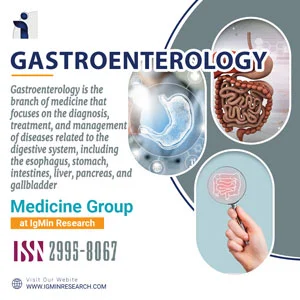Open Access Policy refers to a set of principles and guidelines aimed at providing unrestricted access to scholarly research and literature. It promotes the free availability and unrestricted use of research outputs, enabling researchers, students, and the general public to access, read, download, and distribute scholarly articles without financial or legal barriers. In this response, I will provide you with an overview of the history and latest resolutions related to Open Access Policy.
About
Gastroenterology is the specialized medical field focused on the study, diagnosis, and treatment of disorders affecting the digestive system, which includes the esophagus, stomach, intestines, liver, gallbladder, and pancreas. Gastroenterologists are experts in understanding the intricacies of digestion and the complex interplay of gastrointestinal processes. Their expertise spans from detecting early signs of gastrointestinal diseases to managing chronic conditions and improving patients' digestive health.
The study of gastroenterology involves in-depth knowledge of gastrointestinal anatomy, physiology, and pathology. Gastroenterologists utilize a wide range of diagnostic procedures, including endoscopy, imaging, and laboratory tests, to assess and diagnose gastrointestinal issues. By offering tailored treatment plans and preventive measures, gastroenterology plays a crucial role in maintaining optimal digestive function and overall well-being.
Editors
Medicine Group (1)

Why publish with us?
Global Visibility – Indexed in major databases
Fast Peer Review – Decision within 14–21 days
Open Access – Maximize readership and citation
Multidisciplinary Scope – Biology, Medicine and Engineering
Editorial Board Excellence – Global experts involved
University Library Indexing – Via OCLC
Permanent Archiving – CrossRef DOI
APC – Affordable APCs with discounts
Citation – High Citation Potential
Which articles are now trending?
Research Articles
- Benzo[4’,5’]imidazo[2’,1’:6,1]pyrido[2,3-d]pyrimidines: Past and Present
- Assessing Bee (Hymenoptera, Apoidea, Anthophila) Diversity and Floral Preference in Two Habitats in the Iberian Peninsula
- Correlation between Different Factors of Non-point Source Pollution in Yangtze River Basin
- Use of Augmented Reality as a Radiation-free Alternative in Pain Management Spinal Surgeries
- Soil Water Vegetation Carrying Capacity and Quality Agricultural Produce
- A Study to Determine the Reason for Lower Pregnancy Rates in Younger Women with Diminished Oocyte Reserve-less Chance of Implanting vs. Fetal Demise
Advertisement













